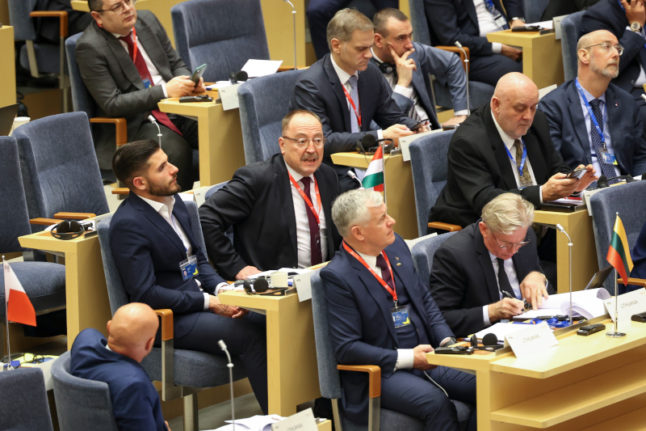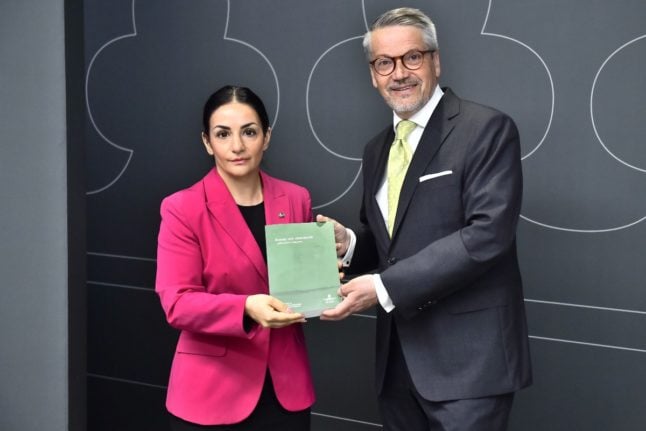Hungary’s Nato delegation in Sweden
A Hungarian delegation is in Stockholm this week to discuss Hungary’s outstanding approval of Sweden’s Nato application.
Turkey has been kicking up a storm for so long with their will-they-or-won’t-they ratification that we all seemed to forget for a while that there is one more country that has yet to accept Sweden as a member of Nato.
The delegation includes Zsolt Németh, chair of the Hungarian parliament’s foreign policy committee, deputy speaker Csaba Hende and two EU parliamentarians – all from Hungary’s ruling party Fidesz.
On Monday they were set to meet Swedish parliamentary speaker Andreas Norlén as well as Peter Hultqvist, chair of the defence committee, Aron Emilsson, chair of the foreign policy committee, and deputy speaker Kenneth G Forslund.
Hungary says it wants Sweden to join Nato and expects to ratify its application in a couple of weeks, but it’s clearly taking this opportunity to raise some issues they have with Sweden. Let’s just say the two countries have not had the warmest of relationships in recent years.
Németh said he wanted Sweden to show “more respect” towards Hungary when asked by Swedish news agency TT what he wanted to get out of this week’s talks. But he also added that he intended to vote yes to both Sweden’s and Finland’s Nato memberships.
We spoke about Hungary and Nato on the latest episode of The Local’s Sweden in Focus podcast – click here to listen.
New poll shows dwindling support for Sweden’s small parties
The Centre Party is polling at its lowest level in almost ten years, in a new summary of several recent opinion polls by Kantar Sifo on behalf of public radio broadcaster Ekot.
The party – whose new leader I wrote about last week – gets only 4.6 percent, but they’re not the worst off. The Liberals get 3.4 percent which means they would lose all their seats in parliament if an election were held today. The Christian Democrats get 4.0 percent, which puts them exactly at the threshold for getting into parliament.
The Social Democrats climb to 36.9 percent, followed by the Moderates at 19.7 percent and the Sweden Democrats at 18.2 percent. The centre-left opposition parties are polling at 53 percent altogether, while 45.3 percent still prefer the government and its coalition.
Swedish council to recount September votes
Laxå, a municipality of some 5,500 people in central Sweden, is recounting votes cast for its local authority in Sweden’s September election, after it turned out that a vote for a Green Party member had not been registered properly.
The vote would have given the candidate a substitute seat on the council, so the Election Authority ordered a recount.
The votes will be recounted at 9am on Tuesday at the County Administrative Board’s office in the city of Örebro. The count is, as all election vote counts are, open to the public.
Sweden Democrats: ‘Learn Swedish or lose your job’
As The Local reported last week, the far-right Sweden Democrats want staff working in the elderly care sector to be dismissed if they don’t speak Swedish, although they should get a year to learn Swedish during non-work hours and if they can pass a test after that they may keep their job.
That’s what they’re going to put to the government when it meets the three coalition parties to discuss an inquiry that will look into language requirements for care home staff, a Sweden Democrat spokesperson told TT.
The parties will need to agree on the details, so any final proposal as a result of the inquiry will not necessarily go as far as retroactively applying a language requirement.
Should TikTok be banned in the Swedish parliament?
The Centre Party wants the Swedish parliament to forbid members of parliament and other parliamentary staff to use Chinese-owned app TikTok, at least on their work devices, following criticism that the app may collect sensitive data from users.
The government offices in November urged its staff to delete the app. The EU parliament, the US, Denmark and Canada have all also introduced restrictions.
Politics in Sweden is a weekly column by Editor Emma Löfgren looking at the big talking points and issues in Swedish politics. Members of The Local Sweden can sign up to receive an email alert when the column is published. Just click on this “newsletters” option or visit the menu bar.



 Please whitelist us to continue reading.
Please whitelist us to continue reading.
Member comments